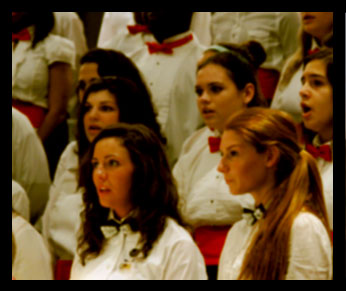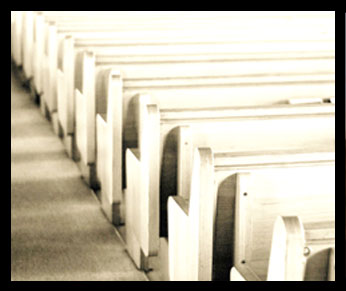by Collette Broady Grund
Do you ever have those moments when you reflect on your life and think, “This is not where I thought I’d be!” I’ve been having a lot of those moments lately, and I have to say, God has been in them all.
Earlier this year I was (I thought) a happily married pastor with a darling 2-year-old boy. My life was everything I’d been working for with my husband for 10 years. And now, it’s something different. I’m divorced.
According to several good friends, and a study in the British newspaper The Guardian and me, the hardest part of recovering from divorce is dealing with the failure of your best intentions for your life with the person you were supposed to love more than anyone. I made a commitment. I intended to honor it, and for many and various reasons, I feel like I failed.
That is hard to say, especially out loud, especially to other people. Feeling like a failure is scary, and not just for the person in the midst of it. Others who see your failed relationship from the outside are frightened too, because if it can happen to me, a pastor, it can happen to them. And nobody likes to feel like a failure.
Yet, as I was talking with my very wise therapist about this difficult subject, he said, “What if there are some things we’re meant to fail at?” What if, sometimes, it is the very success we create for ourselves that is holding us back from being what God intends? What if we need to fail spectacularly at the thing we want to do, so that we can be open to the thing we’re supposed to do?
I think back to those things I consider the greatest disappointments of my life and see through hindsight that they have led me directly to a clearer sense of vocation, of God’s call. While I considered these moments to be failures, God was at work bringing me into closer relationship.
Story of my success
 I was a successful kid and teenager. I did well in school, stood out in music and drama, and I was a leader in my church, both locally and nationally. When I went to college, I expected that success to continue. And it did–for a couple of years. Against my parents’ advice, I had my heart set on being a vocalist, an opera singer. I focused my time, talent and treasure into that pursuit. I steadily advanced through my music lessons. I moved up the choir ranks, and started to gain praise from my peers in vocal performance. Everything was going exactly how I had planned.
I was a successful kid and teenager. I did well in school, stood out in music and drama, and I was a leader in my church, both locally and nationally. When I went to college, I expected that success to continue. And it did–for a couple of years. Against my parents’ advice, I had my heart set on being a vocalist, an opera singer. I focused my time, talent and treasure into that pursuit. I steadily advanced through my music lessons. I moved up the choir ranks, and started to gain praise from my peers in vocal performance. Everything was going exactly how I had planned.
Then, in a matter of seven days, that dream shattered. At the beginning of my junior year, when the rounds of auditions were complete, my progress came to an abrupt end. I was rejected from every group, opera, and vocal studio that I auditioned for. And every one of my peers moved on to bigger and better things without me.
I was crushed. I cried so much that first week that my roommate staged an intervention. It felt like a failure at the time, and I urgently pleaded my case with God for months, accusing God of being deceitful for giving me such a musical gift and then allowing me to experience such failure.
But as the months progressed and the hurt and disappointed receded, I began to ask for God’s guidance. “If I am not to be a musician, then what, God? What is it you want me to do?”
New direction
By the following summer, God had answered my questions with a wholly unexpected plan: I felt that I was supposed to go to seminary and be a pastor. It was something I had never considered before, though when I began to tell others about this new call, they were overwhelmingly affirming. They said that they had suspected I was meant for this vocation for years.
I had been so busy mapping out the course that I wanted for my life, based on one thing I loved and was good at, that I had excluded every other possibility. I guess God knew my stubborn heart well enough to know that it would take something that felt catastrophic before I would really listen to God’s call.
Years later, after earning my Master of Divinity degree from seminary, I was ordained, and serving my first call in a wonderfully supportive parish when I decided to move with my then-husband to Pennsylvania for a one-year teaching appointment. With those time constraints (one year) in this new location, the only option for continuing as a pastor was to take an interim assignment. I gladly accepted this temporary call and was ready to share the wealth of my pastoral knowledge (all three years of it!) with a new congregation.
 Unknowingly, I walked into a church where major problems had been swept under the pew for years, and where my gender, urban credentials, and assignment by the bishop’s office were viewed with suspicion. I poured myself into the work, exercising every bit of the skill I had, trying by sheer force of will to make the congregation love me. And certainly there were successes, with some issues coming to resolution and a handful of faith lives restored.
Unknowingly, I walked into a church where major problems had been swept under the pew for years, and where my gender, urban credentials, and assignment by the bishop’s office were viewed with suspicion. I poured myself into the work, exercising every bit of the skill I had, trying by sheer force of will to make the congregation love me. And certainly there were successes, with some issues coming to resolution and a handful of faith lives restored.
But after 20 months, I quit. I was worn out. I was so angry that it was affecting my health and my marriage and my trust in God. I had done the absolute best that I knew how, and I felt like it had made absolutely no difference. I had never before quit a job, and I hated the feeling.
A new direction
In the months that followed, as I worked with a spiritual director and other pastors, I began to understand what had happened and heal from it. Because of this experience, I discovered a new desire to work with congregations in difficult circumstances or transition. I found colleagues who had tools that worked and a supportive network for when they didn’t. God was using this failure, too to cultivate in me a passion for working with hurting churches, for loving people and places that others thought were failing.
When it was time to begin a new permanent ministry in Minnesota where I now live, I found a call to fit this new passion. This call is challenging, but exciting, and I never would have considered it without the learning that came from that experience in Pennsylvania. In addition to being a professional fit, the two congregations I serve have been unexpectedly wonderful to me in the midst of my divorce—almost as if God knew that I would need these people just as much as they need me.
The divorce is still too fresh to be teaching me many lessons, but I have sensed God’s presence with me from the moment it began. Others going through their own separations and divorces are already coming to me, asking for my insight and support. My relationship with God is more intimate and constant than it has been in years, and I am learning what it truly means to be a forgiven sinner.
The feeling of failure is awful, there is no question, but it is also humbling in a way that can lead to revelation. God has a way of bringing good out of our failure, of using it to realign us with God’s purpose. And although I would not choose to relive any of the experiences I have described, I am profoundly grateful for the course corrections they have brought to my life.
Collette Broady Grund lives in Mankato, Minnesota, with her son.
This article first appeared in the October 2012 issue of Cafe.

